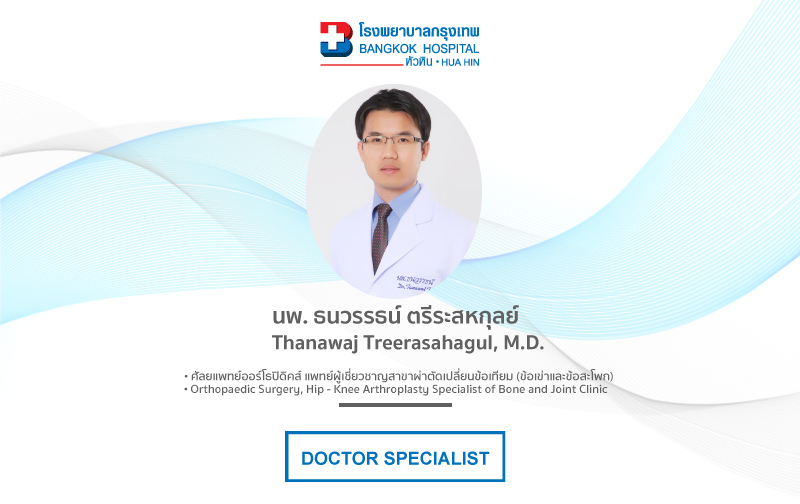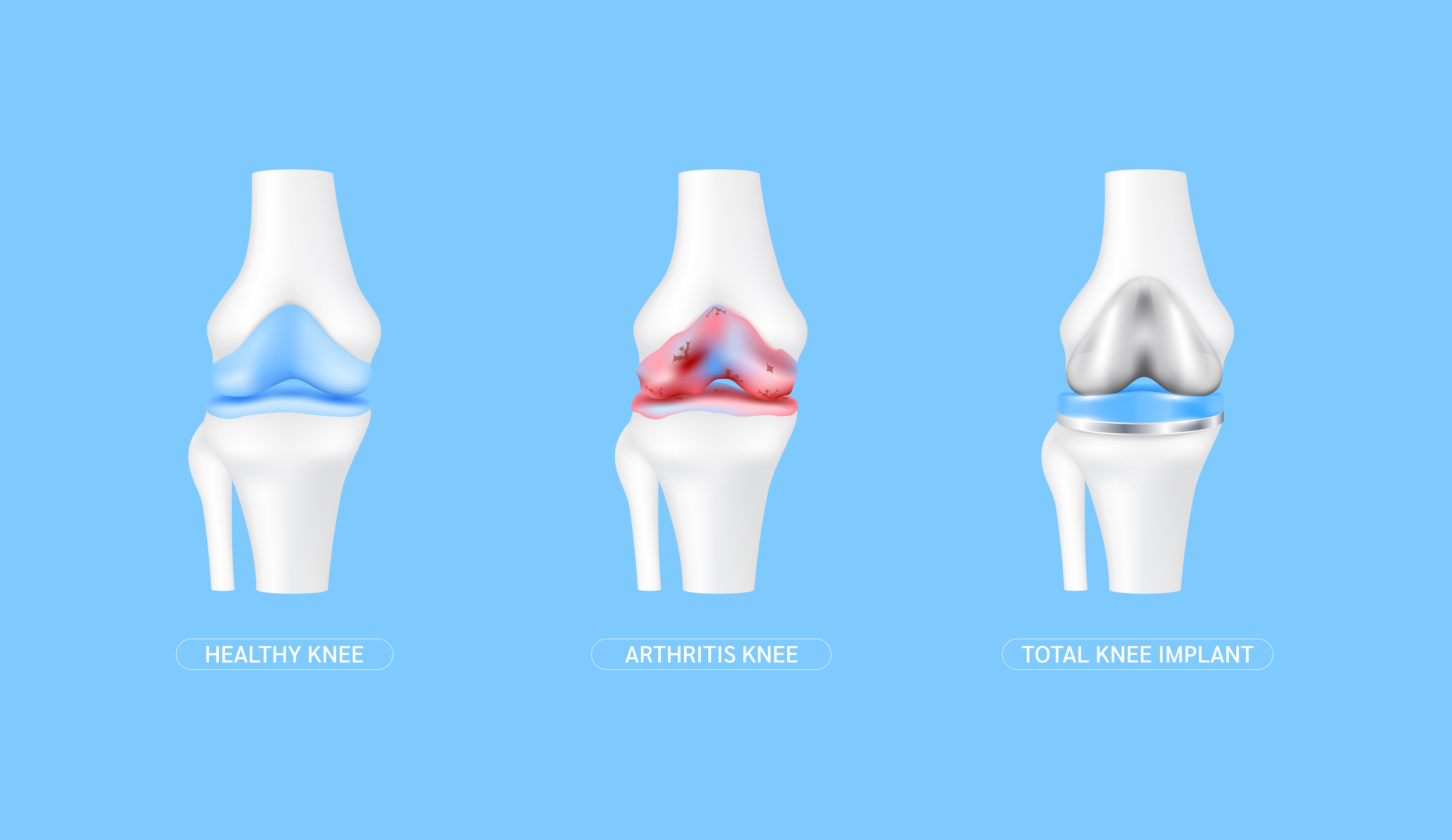Knee Replacement Surgery: Quick Recovery, Walk Before Discharge
Total Knee Replacement (TKR) is an effective treatment for individuals suffering from osteoarthritis that makes daily life difficult. This surgery helps patients regain normal movement. However, many patients worry about severe pain or the possibility of not walking again when they learn they need a knee replacement. This article will explain that knee replacement surgery is not terrifying and significantly improves the quality of life for those who suffer from this condition.
 Dr. Thanawaj Treerasahagul, our orthopedic surgeon and hip – knee arthroplasty specialist at Bangkok Hospital Hua Hin, shares that patients recommended for knee replacement surgery often experience severe knee pain that disrupts daily activities. This includes pain while walking, using stairs, sitting, resting, or sleeping. They may also have chronic knee inflammation, swelling, redness, and knee deformities like bow-leggedness or knock-knees. These symptoms persist despite other treatments such as lifestyle changes, medications, or knee injections.
Dr. Thanawaj Treerasahagul, our orthopedic surgeon and hip – knee arthroplasty specialist at Bangkok Hospital Hua Hin, shares that patients recommended for knee replacement surgery often experience severe knee pain that disrupts daily activities. This includes pain while walking, using stairs, sitting, resting, or sleeping. They may also have chronic knee inflammation, swelling, redness, and knee deformities like bow-leggedness or knock-knees. These symptoms persist despite other treatments such as lifestyle changes, medications, or knee injections.
 Total Knee Replacement Surgery involves pre-operative preparation, including physical examinations and knee X-rays. The surgery typically takes about 2 hours. Afterward, doctors administer pain relief medications alongside cold packs to reduce inflammation.
Recovery after knee replacement surgery begins immediately following the operation. Patients are encouraged to move their knees gently within the first 24 hours and practice ankle pumping exercises to stimulate blood circulation.
Physical therapy is key for recovery after surgery. Patients receive close guidance on appropriate exercises to reduce inflammation and improve mobility, helping them resume normal activities quickly. Within 24 hours post-surgery, patients begin exercises to strengthen leg muscles, bend and straighten the operated knee. Those progressing well may practice standing with weight and walking with assistive devices. Physiotherapists then guide walking exercises, continuous knee bending and straightening, followed by using the restroom and stair climbing. Once patients can walk comfortably with assistive devices without complications, doctors allow them to return home.
Total Knee Replacement Surgery involves pre-operative preparation, including physical examinations and knee X-rays. The surgery typically takes about 2 hours. Afterward, doctors administer pain relief medications alongside cold packs to reduce inflammation.
Recovery after knee replacement surgery begins immediately following the operation. Patients are encouraged to move their knees gently within the first 24 hours and practice ankle pumping exercises to stimulate blood circulation.
Physical therapy is key for recovery after surgery. Patients receive close guidance on appropriate exercises to reduce inflammation and improve mobility, helping them resume normal activities quickly. Within 24 hours post-surgery, patients begin exercises to strengthen leg muscles, bend and straighten the operated knee. Those progressing well may practice standing with weight and walking with assistive devices. Physiotherapists then guide walking exercises, continuous knee bending and straightening, followed by using the restroom and stair climbing. Once patients can walk comfortably with assistive devices without complications, doctors allow them to return home.

 After surgery, patients need to take good care of themselves at home to reduce infection risks and speed up recovery. This includes following doctor-prescribed medication, continuing with physical therapy, avoiding driving and lifting heavy objects for the first 4-6 weeks after surgery. It’s also important to avoid activities that stress the knee, such as squatting, kneeling, sitting cross-legged, sitting on low chairs, or excessive stair climbing. Patients should also steer clear of sports involving impact, jumping, or heavy use of the knees, as well as activities that require rapid bending or twisting of the knee.
“Total Knee Replacement is an effective treatment that can help patients regain full living of their lives. Successful outcomes depend on diligent self-care and consistent physical therapy. With discipline, recovery can be swift, allowing patients to enjoy a happy, normal life. The lifespan of the replacement knee averages 12-15 years, depending on materials chosen and individual activities. Therefore, if you experience knee pain or arthritis, consulting a specialist for appropriate treatment options is advisable. Early and proper treatment can potentially delay deterioration.” Dr. Thanawaj concluded.
After surgery, patients need to take good care of themselves at home to reduce infection risks and speed up recovery. This includes following doctor-prescribed medication, continuing with physical therapy, avoiding driving and lifting heavy objects for the first 4-6 weeks after surgery. It’s also important to avoid activities that stress the knee, such as squatting, kneeling, sitting cross-legged, sitting on low chairs, or excessive stair climbing. Patients should also steer clear of sports involving impact, jumping, or heavy use of the knees, as well as activities that require rapid bending or twisting of the knee.
“Total Knee Replacement is an effective treatment that can help patients regain full living of their lives. Successful outcomes depend on diligent self-care and consistent physical therapy. With discipline, recovery can be swift, allowing patients to enjoy a happy, normal life. The lifespan of the replacement knee averages 12-15 years, depending on materials chosen and individual activities. Therefore, if you experience knee pain or arthritis, consulting a specialist for appropriate treatment options is advisable. Early and proper treatment can potentially delay deterioration.” Dr. Thanawaj concluded.
 *********************************************************************************
For more information, please contact :
Orthopedics Department, Bangkok Hospital Hua Hin, ground floor Tel. 032-616-832 (8.00 – 17.00 hrs.)
Call Center Tel. 032-616-800
*********************************************************************************
For more information, please contact :
Orthopedics Department, Bangkok Hospital Hua Hin, ground floor Tel. 032-616-832 (8.00 – 17.00 hrs.)
Call Center Tel. 032-616-800
 Dr. Thanawaj Treerasahagul, our orthopedic surgeon and hip – knee arthroplasty specialist at Bangkok Hospital Hua Hin, shares that patients recommended for knee replacement surgery often experience severe knee pain that disrupts daily activities. This includes pain while walking, using stairs, sitting, resting, or sleeping. They may also have chronic knee inflammation, swelling, redness, and knee deformities like bow-leggedness or knock-knees. These symptoms persist despite other treatments such as lifestyle changes, medications, or knee injections.
Dr. Thanawaj Treerasahagul, our orthopedic surgeon and hip – knee arthroplasty specialist at Bangkok Hospital Hua Hin, shares that patients recommended for knee replacement surgery often experience severe knee pain that disrupts daily activities. This includes pain while walking, using stairs, sitting, resting, or sleeping. They may also have chronic knee inflammation, swelling, redness, and knee deformities like bow-leggedness or knock-knees. These symptoms persist despite other treatments such as lifestyle changes, medications, or knee injections.
 Total Knee Replacement Surgery involves pre-operative preparation, including physical examinations and knee X-rays. The surgery typically takes about 2 hours. Afterward, doctors administer pain relief medications alongside cold packs to reduce inflammation.
Recovery after knee replacement surgery begins immediately following the operation. Patients are encouraged to move their knees gently within the first 24 hours and practice ankle pumping exercises to stimulate blood circulation.
Physical therapy is key for recovery after surgery. Patients receive close guidance on appropriate exercises to reduce inflammation and improve mobility, helping them resume normal activities quickly. Within 24 hours post-surgery, patients begin exercises to strengthen leg muscles, bend and straighten the operated knee. Those progressing well may practice standing with weight and walking with assistive devices. Physiotherapists then guide walking exercises, continuous knee bending and straightening, followed by using the restroom and stair climbing. Once patients can walk comfortably with assistive devices without complications, doctors allow them to return home.
Total Knee Replacement Surgery involves pre-operative preparation, including physical examinations and knee X-rays. The surgery typically takes about 2 hours. Afterward, doctors administer pain relief medications alongside cold packs to reduce inflammation.
Recovery after knee replacement surgery begins immediately following the operation. Patients are encouraged to move their knees gently within the first 24 hours and practice ankle pumping exercises to stimulate blood circulation.
Physical therapy is key for recovery after surgery. Patients receive close guidance on appropriate exercises to reduce inflammation and improve mobility, helping them resume normal activities quickly. Within 24 hours post-surgery, patients begin exercises to strengthen leg muscles, bend and straighten the operated knee. Those progressing well may practice standing with weight and walking with assistive devices. Physiotherapists then guide walking exercises, continuous knee bending and straightening, followed by using the restroom and stair climbing. Once patients can walk comfortably with assistive devices without complications, doctors allow them to return home.

 After surgery, patients need to take good care of themselves at home to reduce infection risks and speed up recovery. This includes following doctor-prescribed medication, continuing with physical therapy, avoiding driving and lifting heavy objects for the first 4-6 weeks after surgery. It’s also important to avoid activities that stress the knee, such as squatting, kneeling, sitting cross-legged, sitting on low chairs, or excessive stair climbing. Patients should also steer clear of sports involving impact, jumping, or heavy use of the knees, as well as activities that require rapid bending or twisting of the knee.
“Total Knee Replacement is an effective treatment that can help patients regain full living of their lives. Successful outcomes depend on diligent self-care and consistent physical therapy. With discipline, recovery can be swift, allowing patients to enjoy a happy, normal life. The lifespan of the replacement knee averages 12-15 years, depending on materials chosen and individual activities. Therefore, if you experience knee pain or arthritis, consulting a specialist for appropriate treatment options is advisable. Early and proper treatment can potentially delay deterioration.” Dr. Thanawaj concluded.
After surgery, patients need to take good care of themselves at home to reduce infection risks and speed up recovery. This includes following doctor-prescribed medication, continuing with physical therapy, avoiding driving and lifting heavy objects for the first 4-6 weeks after surgery. It’s also important to avoid activities that stress the knee, such as squatting, kneeling, sitting cross-legged, sitting on low chairs, or excessive stair climbing. Patients should also steer clear of sports involving impact, jumping, or heavy use of the knees, as well as activities that require rapid bending or twisting of the knee.
“Total Knee Replacement is an effective treatment that can help patients regain full living of their lives. Successful outcomes depend on diligent self-care and consistent physical therapy. With discipline, recovery can be swift, allowing patients to enjoy a happy, normal life. The lifespan of the replacement knee averages 12-15 years, depending on materials chosen and individual activities. Therefore, if you experience knee pain or arthritis, consulting a specialist for appropriate treatment options is advisable. Early and proper treatment can potentially delay deterioration.” Dr. Thanawaj concluded.
 *********************************************************************************
For more information, please contact :
Orthopedics Department, Bangkok Hospital Hua Hin, ground floor Tel. 032-616-832 (8.00 – 17.00 hrs.)
Call Center Tel. 032-616-800
*********************************************************************************
For more information, please contact :
Orthopedics Department, Bangkok Hospital Hua Hin, ground floor Tel. 032-616-832 (8.00 – 17.00 hrs.)
Call Center Tel. 032-616-800